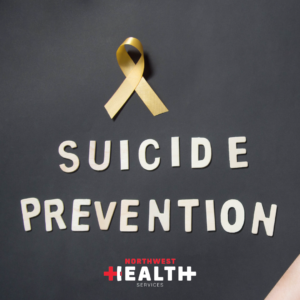September is Suicide Prevention month. On average, one person dies by suicide every 10.9 minutes according to the American Association of Suicidology’s 2018 data. Suicide is sometimes a difficult topic to discuss, but you can do your part to reduce the number of suicides by knowing the signs and what to do in situations.
An understanding of risk factors and warning signs can help to identify someone who may be having thoughts of suicide. Risk factors may contribute to a person’s likelihood of developing suicidal thoughts. Some risk factors include: recent loss of relationship or employment, history of mental health issues, family history of suicide, history of substance use, isolation, or physical illness. If these factors are present then you will need to further assess for warning signs. One warning sign may be a person talking about being trapped, being a burden, or not being around in the future. Other signs which may indicate possible suicidal thoughts are extreme changes in mood, increased use of alcohol or drugs, sleeping too much or too little, or withdrawing from family and friends.
If a person has several risk factors or warning signs it is important to ask if they are thinking of suicide. It is a myth that bringing up or talking about suicide will give someone the idea or encourage them to complete suicide. If they deny having thoughts, be sure to continue to offer support if they are struggling with any issues in their life and encourage them to contact a doctor or therapist. If they do confide in you and tell you they are thinking of suicide it is necessary to remain calm, listen without judgement, and ask if they have a plan or means to carry out their plan. Assist them with reaching out to the National Suicide Prevention Lifeline or contacting local emergency or crisis workers to help them find resources to begin treatment if they have a plan or intention to carry out their plan.
We can all help reduce the number of suicides by knowing the signs and having the information to help someone struggling. Contact the National Suicide Prevention Line at (800)273-8255 if you have further questions on how to help someone. If you yourself are struggling with thoughts of suicide please reach out to someone by contacting the emergency department at your local hospital or contact our local crisis line 24 hours a day at (888)279-8188. Help reduce the number of suicides by listening and helping others- every life is important.
Interested in counseling services? Contact our behavioral health clinic at (816) 232-4417.
Have a great day,
Kelly Adkins, MSW, LCSW

